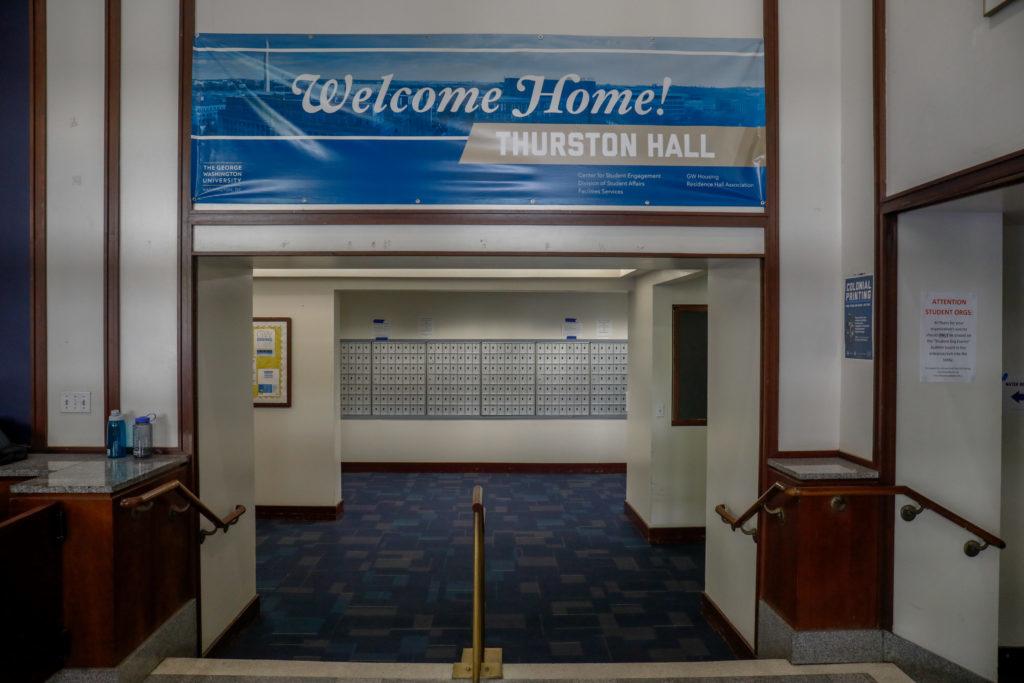Over the past year, officials have been working with outside consultants to come up with a plan to renovate one of its oldest and most criticized buildings – Thurston Hall.
University spokeswoman Maralee Csellar said the consultants have helped officials consider options to possibly renovate the “integral” building on campus, but the talks have led to no concrete plans to revamp Thurston. For years, students have complained about poor living conditions in the aging residence hall and while officials have discussed the need for improvements, major renovations have not been made.
Csellar said the University approved funds in May 2015 to conduct a “future study on the feasibility of a Thurston Hall renovation.”
She said officials brought in outside consultants to provide input on the project but declined to say who the consultants were or for which company they work.
“The student housing experience changes and evolves over time,” Csellar said in an email. “Part of our ongoing conversations, including with student leaders and the Residence Hall Association, is to learn more about the needs of our students as it relates to the building.”
She said there are “no firm plans or a timeline” for Thurston renovations, and the building will definitely not go under construction next summer.
“I want to make sure that we’re putting that sort of collaborative space everywhere that we can.”
Provost Forrest Maltzman said in an interview last month that Thurston’s size – the building has nine floors, a basement level and houses more than 1,100 freshmen each year – makes it difficult to “just take it offline for an extended period of time.”
He said any Thurston renovations would have to be conducted in stages and that officials are discussing options for the work with outside consultants.
“It shapes people’s impression of GW and shapes their freshman year for a lot of students,” Maltzman said. “We’ve done a little bit of work in Thurston over the years, but I think we need to think a lot about common space in that building in particular.”
Thurston has three common areas including the basement, where a communal kitchen was added two years ago, but most floors don’t have common spaces.
Residence Hall Association leadership made the addition of community spaces to halls a major priority last year.
Maltzman said creating more common spaces in residence halls can encourage interaction among students. He said renovating residence halls was a part of the University-wide focus on the student experience.
“They learn by talking to their colleagues and their peers and being part of a diverse community where people come together and interact with each other,” he said. “I want to make sure that we’re putting that sort of collaborative space everywhere that we can.”
In 2014, the University committed to renovating all of its residence halls in seven-year intervals after an influx of student complaints about the buildings’ quality. But Thurston, which is occupied both during the academic year and over the summer as housing for incoming students during Colonial Inauguration, left officials questioning how they could approach renovations to the building.
In 2015, students lobbied for renovations to Thurston, citing ongoing issues like mold, dysfunctional elevators and crusty carpets. At the time, a University spokesman said officials would examine options for upgrading the hall, but since then, officials only added new furniture in 2016.
Thurston was last renovated 10 years ago, when officials spent nearly $14 million to grind away at the building’s brick outer layer to replace failing mortar.
“Students are just temporary tenants. They don’t really take care of their rooms or bathrooms.”
But even newer residence halls, like Fulbright Hall, have presented officials with unforeseen problems during renovations. In July, the University announced that students slated to live on the top four floors of the building in the fall would have to stay in nearby hotels through September after workers encountered “added work” to bathrooms’ concrete foundations during planned summer renovations.
RHA President Rachel Metz said the consultants are part of an “ongoing advocacy initiative” to make improvements to Thurston.
“Based on current and past resident feedback, we continue to work closely with Housing and Division of Operations to assess what opportunities exist to improve the space,” she said in an email.
Henry Koffman, a professor at the University of Southern California with expertise in construction, especially safety issues, said outside consultants will help officials decide how to renovate the building and figure out how much renovations will cost. He said because students live in the building for one year at a time, Thurston should also be renovated annually.
He said buildings are usually designed for a 50-year use and rather than conducting a total overhaul of the building, “it might be better just to tear the darn thing down.”
“Students are just temporary tenants,” Koffman said. “They don’t really take care of their rooms or bathrooms.”





